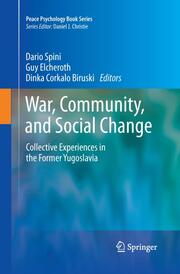-
Zusatztext
-
Collective experiences in the former Yugoslavia documents and analyses how social representations and practices are shaped by collective violence in a context of ethnic discourse. What are the effects of violence and what are the effects of collectively experienced victimisation on societal norms, attitudes and collective beliefs? This volume stresses that mass violence has a de- and re-structuring role for manifold psychosocial processes. A combined psychosocial approach draws attention to how most people in the former Yugoslavia had to endure and cope with war and dramatic societal changes and how they resisted and overcame ethnic rivalry, violence and segregation. It is a departure from the mindset that depict most people in the former Yugoslavia as either blind followers of ethnic war entrepreneurs or as intrinsically motivated for violence by deep-rooted intra-ethnic loyalties and inter-ethnic animosities.
-
-
Kurztext
-
War, Community, and Social Change documents and analyses how social representations and practices are shaped by collective violence in a context of ethnic discourse. What are the effects of political violence, and what are the effects of collectively experienced victimization on societal norms, attitudes, and collective beliefs? This volume stresses that mass violence has a de- and re-structuring role for manifold psychosocial processes. The interdisciplinary approach draws attention to how most people in the former Yugoslavia had to endure and cope with war and dramatic societal changes, but also how they faced and resisted ethnic rivalry, violence, and segregation. It is a departure from the belief that depicts most people in the former Yugoslavia as either blind followers of ethnic war entrepreneurs or as extremists intrinsically motivated for violence by deep-rooted intra-ethnic loyalties and inter-ethnic animosities.
-
Detailansicht
War, Community, and Social Change
Collective Experiences in the Former Yugoslavia, Peace Psychology Book Series 17
ISBN/EAN: 9781489988751
Umbreit-Nr.: 3466086
Sprache:
Englisch
Umfang: xii, 241 S.
Format in cm:
Einband:
kartoniertes Buch
Erschienen am 26.08.2015
Auflage: 1/2014


